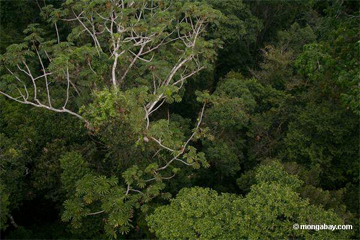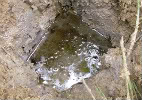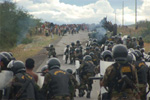Indigenous natives in the Amazon are headed to the town of Salvacion in Peru with a plan to forcibly remove the Texas-based Hunt Oil company from their land as early as today. Peruvian police forces, numbering in the hundreds, are said to be waiting in the town.
The crisis has risen over an area known as Lot 76, or the Amarakaeri Communal Reserve. The 400,000 hectare reserve was created in 2002 to protect the flora and fauna of the area, as well as to safeguard watersheds of particular importance to indigenous groups in the region.
Despite its protected status, in 2006 the Peruvian government granted concessions within the reserve to two oil companies, Hunt Oil and the Spanish company Repsol.
According to FENAMAD (the Native Federation of the Madre de Dios) protections had been slowly and systematically stripped from the reserve without indigenous groups’ input. In addition, FENADMAD contends that Hunt Oil has violated international standards and the Peruvian constitution by going ahead with their operations without approval from the indigenous groups.
 Rainforest in Peru. Photo by: Rhett A. Butler. |
Hunt’s director of environmental health and safety for Lot 76, Silvana Lay, disagrees. He told the Indian Country Today that “we weren’t going to come in until the Master Plan was approved. We waited two years, and during that period we met with the communities and gave information. We have the signatories of everybody saying the work can go ahead – within the rules, of course. And then we received a call saying the work cannot go ahead.”
However, indigenous groups say that Hunt Oil only met with two communities: the Shintuya and the Puerto Luz, leaving others who use the reserve out in the cold.
A document written by FENAMAD further alleges that the Environmental and Social Impact Study conducted by Hunt Oil and approved by the federal government is “completely irresponsible and [does] not describe any reality for the area. It was approved illegally and unconstitutionally, in spite of the observations made by a group of professionals from civil society in Madre de Dios.”
On September 13th of this year representatives of indigenous groups released a statement that said “the entry of Hunt Oil and Respol into the interior of the Amarakaeri Communal Reserve to execute seismic projects is not accepted, a decision that will be respected by the Peruvian State, Hunt Oil and Repsol, who have been present witnesses to this decision.”
However, Hunt Oil has continued its seismic surveys inside the reserve. It is their unwillingness to halt activities that has prompted the indigenous groups to travel to Salvacion and, according to statements made by the indigenous groups, forcibly remove the US-corporation from their land.
“The most vulnerable ecological and cultural areas are now being invaded by seismic lines, whose impacts are irreparable. The area of intervention is one of very high biological value from a worldwide perspective and its surface and underground hydrological system have great cultural significance for the Harakmbut, which makes this a vital space for the subsistence of not only the indigenous communities, but the greater population of the Amazon Basin,” the document by FENAMAD states. “For that reason, all of the beneficiary communities of the RCA have taken the position of impeding the entrance into the oil block and defending the protected area with their lives.”
FENAMAD’s statement may be a portent: in June a clash between native peoples and Peruvian police over exploitation of the Amazon turned bloody. Thousands of indigenous people blocked roads to protest new rule changes that made it easier for foreign companies to extract oil, gas, minerals, and timber from the Peruvian Amazon, including tribal lands. During the ensuing clash, twenty-three police were killed and at least ten protestors, according to official numbers. Indigenous groups, however, say that hundreds remain missing and have asked for a Truth Commission to investigate the tragic incident.
Related articles
Heavy oil pollution remains in Amazon, despite company claiming clean-up is finished

(09/17/2009) A new report shows that the Corrientes region of the Peruvian Amazon, which suffered decades of toxic contamination by Occidental Petroleum (OXY), is far from being cleaned-up. The survey, conducted by US non-profit E-Tech International, found that heavy metals, volatile organic compounds, and hydrocarbons still exist at levels above the safety limits set by Peru and continue to threaten the Achuar indigenous community, who have long fought against the oil companies.
Oil road transforms indigenous nomadic hunters into commercial poachers in the Ecuadorian Amazon

(09/13/2009) The documentary Crude opened this weekend in New York, while the film shows the direct impact of the oil industry on indigenous groups a new study proves that the presence of oil companies can have subtler, but still major impacts, on indigenous groups and the ecosystems in which they live. In Ecuador’s Yasuni National Park—comprising 982,000 hectares of what the researchers call “one of the most species diverse forests in the world”—the presence of an oil company has disrupted the lives of the Waorani and the Kichwa peoples, and the rich abundance of wildlife living within the forest.
Police face murder charges in killing of indigenous protesters in Peru
(08/16/2009) A federal prosecutor in Peru filed murder charges against two police generals and 15 other officers over the deaths of indigenous protesters at a roadblock in June, reports the Associated Press. The Indians were protesting new rules that would have made it easier for foreign developers to exploit oil and gas, timber, and minerals in Peru’s Amazon rainforest. The skirmish left 23 police and at least ten protesters dead.
Peru to proceed with oil and gas auctions in the Amazon despite indigenous protests
(08/07/2009) Despite violent protests by indigenous groups over plans to expand oil and gas exploration in the Peru’s Amazon rainforest, energy investments in the South American country are expected to increase to $1.5 billion in both 2009 and 2010, reports Reuters.
Peru to raise payment to indigenous communities for Amazon forest conservation
(08/03/2009) Peru’s environment minister now says the government will pay indigenous communities 10 sols ($3.30) for every hectare of rainforest they help to preserve, reports the Latin American Herald. Previously Antonio Brack said that communities would see about half that amount. The $3.30-per-hectare figure is low by international standards. Under a proposed mechanism that compensates countries for reducing deforestation (REDD), forest land could be worth $800 or more per hectare for its carbon (225 tons of carbon/ha), depending on its level of threat. Forests in areas of high deforestation would be compensated at a higher rate than inaccessible forests at low-risk of development. But Brack left open the possibility that communities could receive higher payment if parties agree to include REDD compensation in a future climate framework.

(08/03/2009) Barely six weeks after a dozen Amazon natives were gunned down by the Peruvian Army in the oil town of Bagua for protesting the cozy relationship between Big Oil and the government of President Alan Garcia, I find myself on the banks of the Mother of God River in Salvacion, Peru, wondering if all those folks died in vain. Any day now, the bulldozers will be moving in as Texas-based Hunt Oil Company – with the full go-ahead of the Peruvian government — fires its first salvo in its assault against the million-acre pristine rainforest wilderness of the little-known and largely unexplored Amarakaeri Communal Reserve.
Peru revokes decrees that sparked Amazon Indian uprising

(06/19/2009) Peru’s Congress revoked two controversial land laws that sparked violent conflicts between indigenous protesters and police in the country’s Amazon region. The move temporarily defuses a two-week crisis, with protesters agreeing to stand down by removing blockades from roads and rivers. Congress voted 82-14 Thursday to overturn legislative decrees 1090 and 1064, which would have facilitated foreign development of Amazon land. Indigenous groups said the decrees threatened millions of hectares of Amazon rainforest and undermined their traditional land use rights.
Peru suspends decree that triggered bloody conflict between Indians and police
(06/11/2009) Peruvian lawmakers yesterday suspended a controversial decree that contributed to a bloody conflict between police and indigenous protesters in the country’s Amazon region, reports the AFP.
(06/06/2009) More than 70% of the Peruvian Amazon has been allocated for oil and gas extraction, and the current government of Alan Garcia has been pushing for more. Unfortunately, as usual, these policies are promoted by and only benefit a handful of people, but negatively impact the lives of many. However, Garcia’s government did not foresee the potential consequences of their actions.
Peruvian police kill 10 Indians in battle over Amazon oil drilling
(06/06/2009) At least 30 are dead following a clash between police and Indians protesting oil development in Peru’s Amazon region.
Peru may take military action against Indians protesting Amazon energy development
(05/19/2009) Indigenous protesters have stepped up demonstrations over the Peruvian government’s moves to support energy development in the Amazon rainforest, reports Reuters.